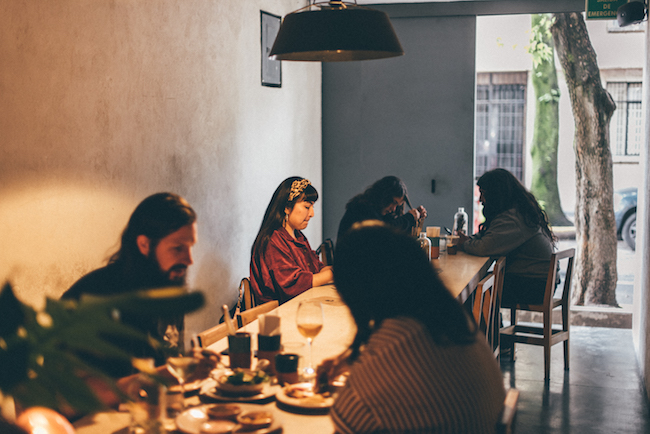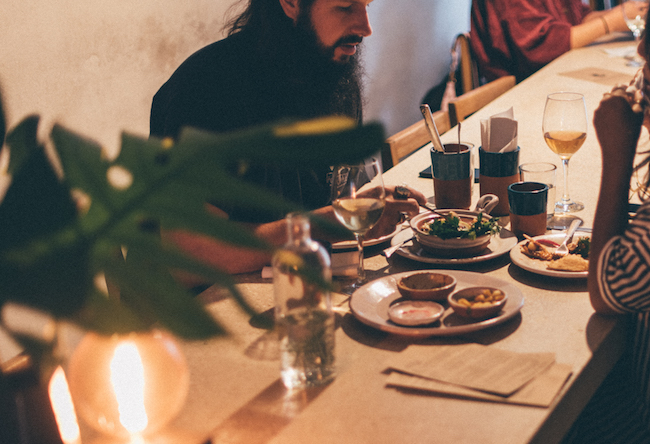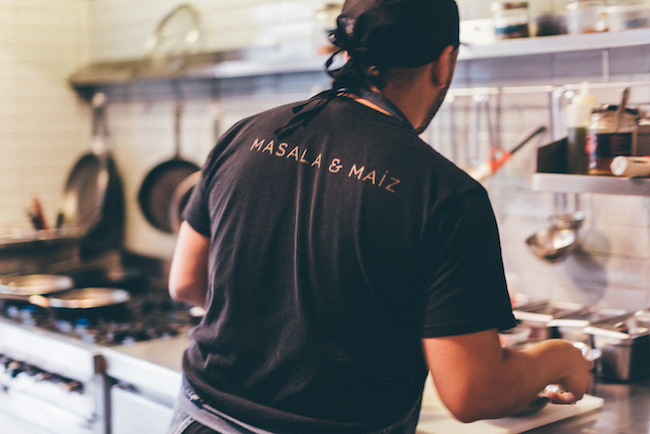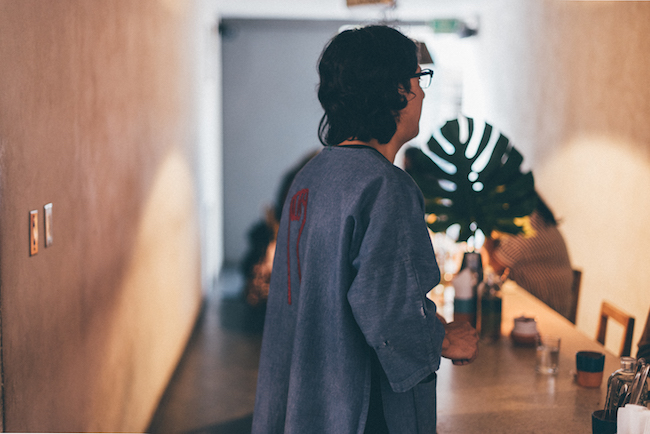It is 10 o’clock in the morning on a Wednesday in the neighborhood of San Miguel Chapultepec: quiet, residential, and not even a kilometer from Condesa. From the outside looking in, Masala y Maíz looks unpresumptuous, except for its yellow façade that exudes a funky vibe. Inside, the space is narrow, and deep, with one long table dividing it in two; it is a table set up for thoughtful dialogue, delicious food, and difficult conversations, just the way Norma Listman and Saqib Keval had in mind.

Mestizaje rebelde
Masala y Maíz is an unconventional restaurant owned and headed by Norma Listman and Saqib Keval. Norma is originally from Mexico City but lived in her neighboring country to the north for 17 years. Saqib is first-generation born in the United States (Oakland, California) and is of East African and Indian descent. The couple met cooking in the Bay Area, but it wasn’t until a friend’s dinner party that they made their first menu together. From then on, the rest is history.

Chefs Norma Listman & Saqib Keval, owners of Masala y Maíz
Masala y Maíz’s cuisine is not a fusion, which is a term that both chefs reject, but rather a mestizaje of their roots. The English translation of the word is miscegenation, which means “marriage or cohabitation of persons of a different race.” Norma elaborated on the description, “We call our cuisine mestizaje rebelde, or “rebellious mestizaje,” because the word [mestizaje] itself encompasses a complicated history. It doesn’t deny the oppression systems that come with colonization. In fact, it names them, while also giving credit to everybody else who forms that particular culture, in food specifically, at a specific time and place.”

Photo: Local.mx
A project by chance
In 2017, Norma returned to her hometown of Mexico City after 17 years in the United States in order to study the intricacies of indigenous Mexican corn (and continues to do so). Saqib remained in California working in the community. So, at what point did Masala y Maíz fit into the equation?

“We didn’t dream up the project, the project dreamed us up in a way,” Norma stated with a smile. Originally, Masala y Maíz was the real-life couple’s side dream project. They had planned to take it on the road to Japan and other countries, but later, the opportunity arose to occupy their current space and no wasn’t an answer. Saqib then made the move to the Mexican capital.

Donut selection for breakfast at Masala & Maíz
Officially opened in late 2018 after a fight against corruption and bureaucratic barriers, the restaurant has proven to be much more than a place to enjoy a meal. “We never wanted Masala y Maíz to be a traditional restaurant. It is more of a platform to explore art, politics, justice issues, and of course, food. Food is a vehicle for these more complicated subjects and a way of disseminating issues in a tangible, palatable way. We are cooking with a very particular tension,” says Norma.
Food and politics, a philosophy
Both chefs come from politicized families and have made tough issues a way of life. “We think that food is an opportunity to talk about politics, and a dish is a great starting point to do that. We like interesting conversations around the table,” says Norma. Their dishes are a way of dreaming up how two cultures can come together around a particular ingredient, while also understanding (and accepting) where the divergences are.

For the chefs, food is a tool of resistance and a way to provoke change in the community. When asked about how Masala y Maíz acts as a platform—beyond their fundamental concept of mestizaje rebelde—Saqib spoke of conversations not only with their farmers and guests but also with their staff along with the idea of politicizing everyone together.
“I think a recent example was the terrorist attack in New Zealand and having a moment to talk with our staff during line-up, which is usually when we address new plates and ingredients. However, we also use that time to talk about social issues and to inform people,” says Saqib.

Information and conversation can change perspectives and inspire change, but the duo also knows that their philosophy must also be present in how their restaurant operates. “Many restaurants are based on the subjugation of the staff’s labor. For us, it’s important that our tips are equal across the board, that everyone is paid equally, that labor is shared, that people have fixed schedules so that they can plan their lives outside of the kitchen, and that they get paid overtime,” Saqib points out. “My background is as a restaurant worker rights organizer. For me, it’s always been about imagining what a community-centered or justice-centered restaurant or food enterprise would look like.”
Humility and responsibility
In no time, Masala y Maíz has become the talk of the culinary world, with mentions in large outlets such as The New York Times and National Geographic. The spotlight is theirs. “It’s been surreal, like an out-of-body experience. It’s humbling, but at the same time, it provokes a sense of responsibility and duty. I feel like I need to work harder and hold myself and my staff to a higher standard,” Norma commented as Saqib nodded his head in total agreement.

So, what’s next? It’s the question Norma and Saqib seem to hear on repeat. But for the community-focused chefs, growth takes on a more purposeful meaning. “Yes, we are going to expand, but growth for us is not a bigger restaurant. It’s being able to provide a higher standard of living for our staff. It’s better benefits, better pay, tips, infrastructure, time off,” says Saqib.
Norma and Saqib are actively making a change in Mexico City. They are brilliant examples of doing what you love and not sacrificing values for profit. With a philosophy relevant to the world, the two chefs remind us that we always have a choice to have a conversation and enjoy a meal while doing so.
Address: Calle Gobernador Protasio Tagle 66A, San Miguel Chapultepec II Secc
Photos: Ritta Trejo
Follow Evan and Ritta on Instagram.
***
Other articles that may interest you:
Niddo, a Restaurant Inspired by World Travels
LynLyn: the Fresh, Healthy Deli in front of Parque España
Raku: a Coffee Shop with Minimalist Vibes and Japanese Precision






